34 Best Foods for Piles for Faster Recovery
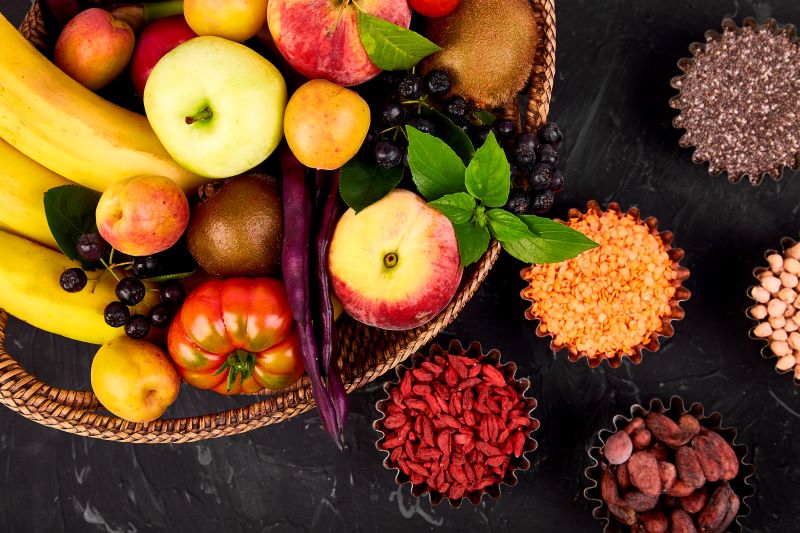
Haemorrhoids frequently cause pain or bleeding from the anus during stools. Although there are other potential causes, one of the main causes of this condition is constipation resulting from a poor diet. Proper diet management, including good food for piles, is essential to reducing symptoms and preventing the condition from worsening.
As a result, it is imperative to monitor what you eat and incorporate a diet rich in fruits and vegetables. Consuming good foods for piles, such as fruits, vegetables, and whole grains, can help move stool more easily and reduce the likelihood of pain. Carefully modifying one's diet can help promote better health and a quicker recovery.

Table of Contents

What are Piles/Haemorrhoids?
Piles, also known as haemorrhoids, are enlarged, inflamed blood vessels situated in or around the rectum and anus. They can cause uneasiness, agony, tingling, or bleeding during defecation. Piles can be internal (inside the rectum) or external (around the anus). Common causes include straining when passing stools, chronic constipation, and sitting for long periods.
Lifestyle changes can manage symptoms like consuming more fibre and keeping oneself hydrated. In severe cases, over-the-counter treatments and medical procedures may also be required. In such situations, it is recommended to consult a specialist who will provide a correct diagnosis, prescribe appropriate piles treatment methods, and provide suitable food for piles.
34 Best Food for Piles
Piles are a common problem for men and women with constipation issues; they lead to swelling of the rectum veins or the area outside the anus. Avoiding it for a prolonged period can lead to irritation, rectal bleeding, and constant itchiness.
Gradually, individuals have to opt for an expensive medical procedure. Consuming high-fibre foods in piles is a smart way to avoid such issues.
Nevertheless, here are some food suggestions to add to the diet for piles and their nutritional values:
List of Fibre Rich Foods for Piles
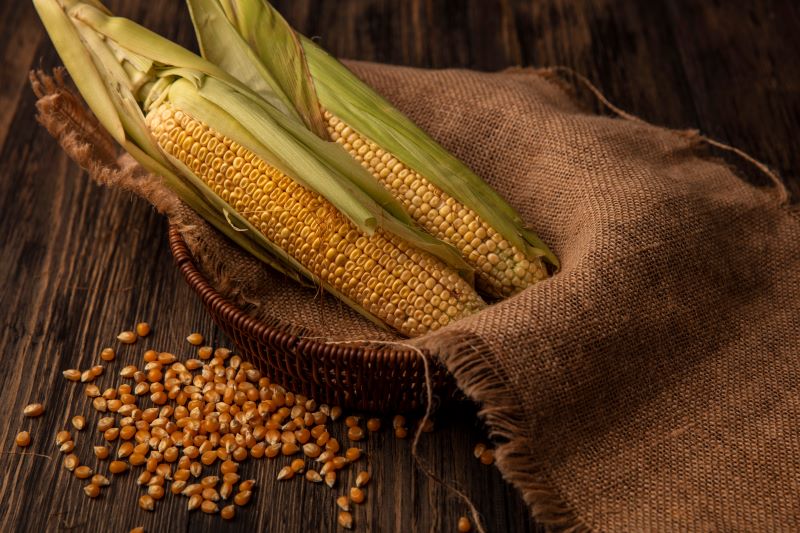
Fibre-rich foods for piles help ease bowel movements and prevent constipation. They add bulk to the stool and promote a healthy digestive system.
| SNo. | Food | Description | Amount of Fibre (per 100g) |
| 1 | Wheat Bran | Wheat bran is rich in insoluble fibre, adding bulk to stool for easier bowel movement. A 1/3 to 1/4 cup serving contains 9.1 to 14.3 g of fibre. Shredded wheat, recommended for piles patients, offers 5 to 9 g of fibre and is also high in protein, B vitamins, iron, and magnesium. | 42.8 g |
| 2 | Barley | Barley is a superfood that supports gut health and is beneficial for maintaining colon health. Rich in soluble fibre (beta-glucan), it provides B vitamins, iron, zinc, and selenium. | 17.3 g |
| 3 | Corn | Corn can be eaten boiled, as popcorn, or in salads. One cup of cooked sweet corn contains around 4.2 g of fibre, which promotes healthy stool movement. It also contains fibre, B vitamins, vitamin C, potassium, magnesium, and antioxidants (lutein and zeaxanthin). | 2.7 g |
| 4 | Oatmeal | Oatmeal can be included in breakfast to help prevent haemorrhoids. It softens the bowel and reduces the risk of straining or obstructions. Contains soluble Fibre (beta-glucan), protein, iron, magnesium, and B vitamins. | 10.6 g |
| 5 | Whole Grain | Whole grains are high in fibre, helping to ease discomfort related to haemorrhoids. The fibre in whole grains supports smooth stool passing and reduces pain in the anus. Provide Fibre, B vitamins, magnesium, iron, and other essential nutrients. | 9-15 g |
| 6 | Lentils | Lentils, including pulses, split peas, chickpeas, and beans, are common in Indian cuisine and are excellent sources of fibre for easy bowel movement. They are also high in protein and fibre, as well as iron, folate, magnesium, and potassium. | 7.9 g |
Apart from checking the excellent food for piles, individuals should list the vegetables to include in their balanced diet. This will help them plan the perfect meal regime that supports healthy bowel movements.
List of Fibre Rich Vegetables for Piles
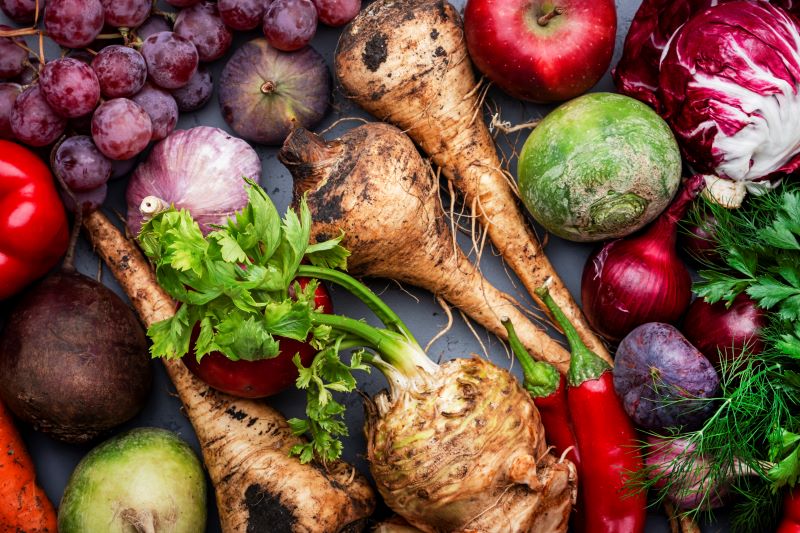
High-fibre vegetables support regular bowel movements and provide essential nutrients. They are gentle on the digestive system and can help manage symptoms.
| SNo. | Vegetables | Description | Amount of Fibre (per 100 g) |
| 7 | Artichoke | Artichokes are petal-shaped vegetables that contain prebiotic compounds that promote gut health and bowel movement. High in fibre, vitamins (C and K), folate, and antioxidants. | 6.2 g |
| 8 | Cruciferous Vegetables | Cruciferous vegetables, such as cauliflower, broccoli, cabbage, kale, bok choy, radishes, and turnips, are rich in fibre and support stool movement. They are also rich in vitamins (C and K), folate, and phytonutrients. | 1.5 - 2.3 g |
| 9 | Root Vegetables | Root vegetables like turnips, sweet potatoes, carrots, rutabagas, beets, and potatoes are rich in fibre and nutrition. Ideal for gut health and bowel movement. Contains fibre, vitamins (A and C), potassium, and antioxidants. | 3-5 g |
| 10 | Squash | Squash varieties such as zucchini, pumpkin, yellow squash, and butternut squash are colourful vegetables that enhance dishes and improve gut health. High in fibre, vitamins (A and C), potassium, and antioxidants. | 5-9 g |
| 11 | Bell Pepper | Bell peppers contain about 93% water, helping to soften stool and promote bowel movement. Individuals who don't prefer vegetables can turn to fruits for piles, which offer natural sweetness and can be enjoyed during breakfast or as snacks. Contains fibre, vitamins (C and A), and antioxidants. | 2.1 g |
List of Fibre Rich Fruits and Juices for Piles
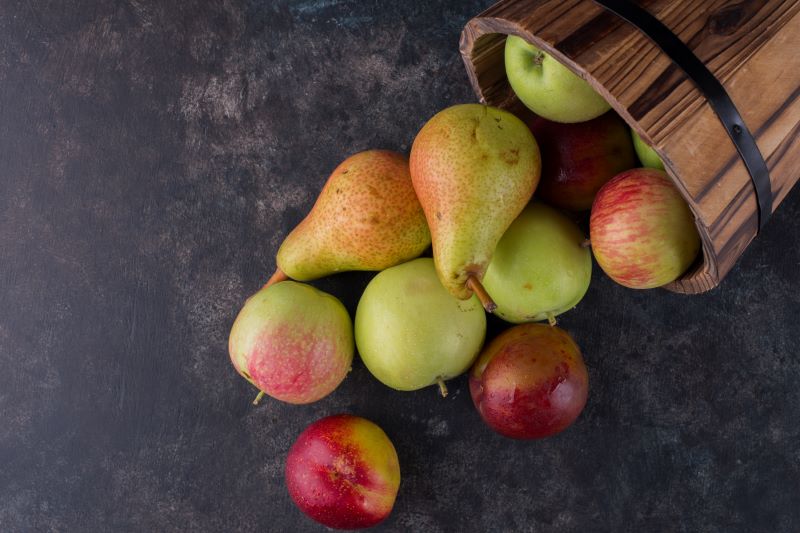
Fruits and juices with high water and fibre content help soften stool and keep people hydrated. They also provide important vitamins and minerals for overall health.
| SNo. | Fruits and Juices | Description | Amount of Fibre (per 100 g) |
| 13 | Apples | Apples are an excellent food to eat during piles as they contain a soluble fibre called pectin. Pectin helps bacteria ferment and form short-chain fatty acids, which add water to the colon and soften stool. Rich in potassium and a small amount of calcium, phosphorus, and magnesium. | 3.7 g |
| 14 | Prunes | Prunes contain cellulose that increases the water content in stool, making them an ideal food for curing piles. They are fermented in the colon, producing short-chain fatty acids that increase stool weight. Contains potassium, iron, magnesium, and manganese. | 3-6 g |
| 15 | Kiwi | Kiwi contains actinidin, a compound that improves bowel movement and gut health. A single kiwi contains about 2.3 g of fibre and can be consumed raw or in a smoothie. It is high in potassium and provides calcium, magnesium, and phosphorus. | 2.3-3 g |
| 16 | Raspberries | Raspberries are delicious and nutrient-rich, with nearly 85% water content that helps soften stools. Provide potassium, magnesium, iron, and calcium. | 8.4 g |
| 17 | Bananas | Bananas are a readily accessible remedy food for piles. They contain resistant starch and pectins, which break down food into a sticky gel in the digestive tract, aiding smooth stool passing. Rich in potassium and provides magnesium, manganese, and small amounts of calcium and iron. | 2.7 g |
| 18 | Pears | Pears are great for smoothies and drinks. They are rich in fibre and compounds beneficial for haemorrhoid patients. The fructose content acts as a laxative, aiding bowel movement. A good source of potassium and contains small amounts of magnesium, calcium, and iron. | 4.0 g |
List of Fibre Rich Dairy Products and Nuts for Piles
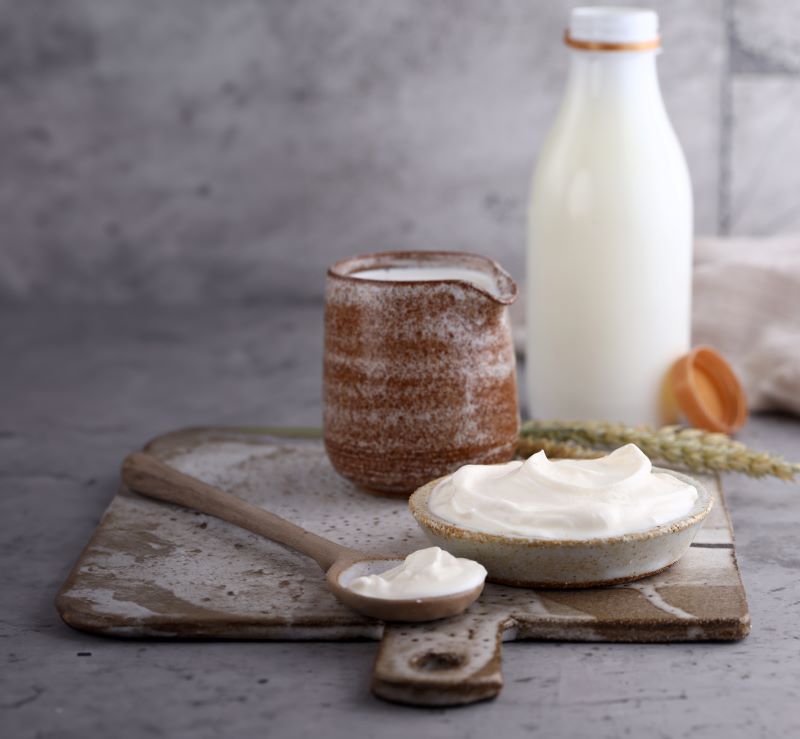
Low-fat dairy products and nuts offer probiotics and healthy fats, supporting gut health and digestive regularity.
| SNo. | Dairy Products and Nuts | Description | Amount of Fibre (per 100 g) |
| 18 | Yoghurt | Yoghurt is a beneficial food for piles patients as it contains probiotics, which help maintain healthy gut flora and promote digestion. Opt for plain, unsweetened yoghurt for best results. Rich in protein and calcium, it contains probiotics that support gut health and provides vitamins B2 and B12. | 0 - 1 g |
| 19 | Buttermilk | Buttermilk is another dairy product that can soothe the digestive tract and help soften stools. Its natural acidity and probiotics can aid digestion and promote gut health. Contains protein, calcium, and other essential minerals and has probiotics for digestive health. | 0-2 g |
| 20 | Almonds | Almonds are a great source of healthy fats, fibre, and antioxidants. Eating a small portion of almonds daily can help improve bowel movements and promote overall digestive health. High in healthy fats, fibre, and protein, and rich in vitamin E, magnesium, and other essential minerals. | 12.5 g |
| 21 | Walnuts | Walnuts are rich in fibre and omega-3 fatty acids, which can help reduce inflammation and promote healthy bowel movements. They can also be a healthy snack option for piles patients. It contains antioxidants and essential minerals such as magnesium and phosphorus. | 6.7 g |
| 22 | Flaxseed | Flaxseed contains high omega-3 fatty acids and soluble fibre, which can help soften stools and improve digestion. Ground flaxseed can be added to cereals, smoothies, or yoghurt for a fibre boost. Rich in lignans, it contains essential minerals such as magnesium and phosphorus. | 27.3 g |
List of Fibre Rich Vegetarian Food for Piles
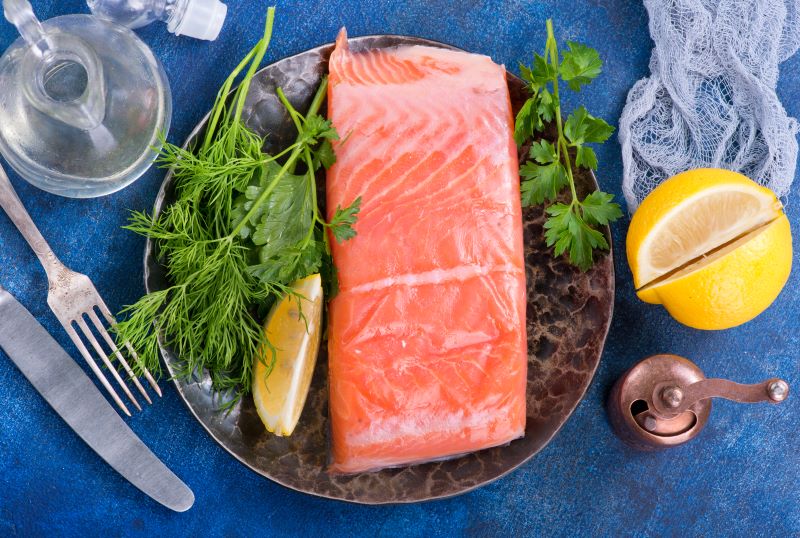
Vegetarian foods rich in fibre and essential nutrients help maintain a balanced diet and support digestive health, promoting regular bowel movements.
| SNo. | Food | Description | Amount of Fibre (per 100 g) |
| 23 | Brown Rice | Brown rice is a whole grain rich in fibre, which can help promote healthy digestion and prevent constipation. Rich in complex carbohydrates, fibres, and vitamins such as B vitamins and minerals like magnesium, phosphorus, and selenium. | 1.8 g |
| 24 | Quinoa | Quinoa is a protein-rich whole grain that contains fibre and vitamins. It aids in digestion and can be a healthy addition to a vegetarian diet for piles patients. High in minerals like magnesium, iron, and zinc. | 2.8 g |
| 25 | Sweet Potatoes | Sweet potatoes are rich in fibre and have anti-inflammatory properties. They help soften stools and improve bowel movements, making them ideal for piles patients. It is high in complex carbohydrates and rich in vitamins A and C and minerals such as potassium and manganese. | 3.0 g |
| 26 | Chickpeas | Chickpeas, or garbanzo beans, are high in fibre and protein. They can be added to salads, soups, stews, and other vegetarian dishes to support a healthy digestive system. Contains vitamins such as folate and minerals like iron, magnesium, and phosphorus. | 3.3 g |
| 27 | Pumpkin Seeds | Pumpkin seeds are a good source of fibre and healthy fats. They can help improve digestion and reduce inflammation. Eating a small portion of pumpkin seeds as a snack can benefit piles patients. High in minerals such as magnesium, zinc, and iron, it also provides vitamins E and K. | 18.4 g |
List of Protein Rich Non-Vegetarian Food for Piles

Lean protein sources are easier to digest and contribute to a balanced diet. Although non-vegetarian foods lack fibre, they provide essential protein that supports recovery and overall health.
| SNo. | Food | Description | Amount of Protein (per 100 g) |
| 28 | Skinless Chicken Breast | Skinless chicken breast is a lean source of protein that is low in fat. It can help maintain muscle health and support digestion without irritating the digestive system. Contains essential vitamins such as B6 and B12, as well as minerals like phosphorus and selenium. | 31 g |
| 29 | Salmon | Salmon is rich in omega-3 fatty acids, which have anti-inflammatory properties. It can help reduce inflammation in the body and may relieve symptoms associated with piles. It is rich in high-quality protein and vitamins D and B12. It also contains minerals such as selenium and iodine. | 20 g |
| 30 | Turkey | Turkey is another lean protein source that is low in fat and easily digested. It is a good option for patients who want to maintain a balanced diet. A good source that contains vitamins B6 and B12 and minerals such as zinc and selenium. | 29 g |
| 31 | White Fish | White fish such as cod, haddock, and tilapia are low in fat and provide essential nutrients. These types of fish can be gentle on the digestive system and promote overall health. Contains vitamins such as D and B12, and minerals like selenium and iodine. | 20-25 g |
| 32 | Eggs | Eggs are a good source of protein and essential nutrients. They are easy to digest and can be included in a piles-friendly diet. Boiled or poached eggs are preferable as they are lower in fat. Contains vitamins A, D, E, and B12, as well as minerals such as iron, zinc, and selenium. | 13 g |
| 33 | Shrimp | Shrimp is low in fat and calories while being a good source of protein. It is easy to digest and can be incorporated into various dishes to support a healthy diet for piles patients. It contains vitamins D and B12 and is also high in minerals such as iodine, zinc, and selenium. | 24 g |
| 34 | Turkey Bacon | Turkey bacon is a leaner alternative to traditional pork bacon and can be included in a piles-friendly diet. It is lower in fat and may help maintain a balanced diet without irritating the digestive system. Provides certain vitamins, such as B6 and B12. | 13 g |
Causes of Piles/Haemorrhoids
Piles are engendered by inflammation and enlargement of blood vessels located in the rectum or anus. Several factors contribute to piles:
- Chronic Constipation: When a person strains too hard during their bowel movements because of regular constipation, it exerts extra pressure on the veins around their rectum. This causes them to swell, thus leading to piles.
- Pregnancy: During pregnancy, hormonal changes take place in women’s bodies, which may put more stress on the pelvis region, thereby resulting in pile development.
- Obesity: Veins around the rectal area can be compressed due to overweightness, thus heightening the chances for an individual to suffer from piles.
- Prolonged Sitting or Standing: Sitting down or standing up for long periods can disturb normal blood circulation within the lower part of the human body, leading to enlarged veins.
- Low-Fibre Diet: Lack of fibre in daily meals may lead to hard stools that require straining when passing a motion. Eating enough roughage ensures soft stools and prevents constipation.
Symptoms of Piles/Haemorrhoids
Piles can cause uncomfortable symptoms that impact a person's quality of life. Here are some common symptoms of piles, along with explanations:
- Pain or Discomfort: During bowel movement, piles can cause pain or discomfort around the anus. This happens due to irritation and inflammation of the veins in that area.
- Rectal Bleeding: Piles usually lead to bleeding at the rectum during or after defecation. It often appears as bright red blood on toilet paper or in the toilet bowl. It occurs when swollen veins get damaged or irritated while passing stool.
- Itching or Irritation: Piles can make the skin around the anus feel itchy and irritated. This may be caused by swollen veins rubbing against the skin all the time or by mucus from piles.
- Swelling or Lumps: Around the anal region, piles could cause swelling, which is noticeable. These could be internal or external, depending on where these veins have enlarged.
- Feeling of Incomplete Bowel Movement: Even after passing stool, some individuals with piles may have the impression that they still need to empty their bowels. This could be due to congested blood vessels blocking faecal matter from coming out properly.
These symptoms can range from mild to severe, and their intensity may vary depending on the individual's condition. If you experience persistent or worsening symptoms, seeking medical advice for a proper diagnosis and treatment is important.
How to Maintain a Healthy Diet for Piles?
A healthy diet incorporates foods good for piles that facilitate smooth bowel movements and prevent constipation. Here are some tips for a healthy food diet for piles:
10 Food Items to Avoid When Suffering from Piles

Exerting strain or pressure on the abdomen can lead to piles, enlarged veins around the anus, pain, and discomfort. Consuming processed, low-fibre foods strains digestion, resulting in constipation and potentially haemorrhoids.
SNo. |
Food Item | Reasons to Avoid |
| 1 | Alcohol | It can dehydrate the body and irritate the digestive system, exacerbating piles symptoms. |
| 2 | Chocolates | It is high in sugar and can lead to constipation and worsening piles. |
| 3 | Packaged snacks | Often low in fibre and high in salt, which can irritate the digestive system and cause inflammation. |
| 4 | High caffeine drinks | It may dehydrate the body and cause constipation, aggravating piles symptoms. |
| 5 | Salty and fried foods | It can cause bloating and constipation due to high sodium and unhealthy fats. |
| 6 | Dairy products containing fats | It can be heavy on the digestive system, potentially causing constipation. |
| 7 | Processed foods | Generally low in fibre and nutrients, it leads to digestive issues and worsening piles symptoms. |
| 8 | Red meat | It may be difficult to digest and can cause constipation straining bowel movements. |
| 9 | Carbonated, energy, and sports drinks | It can cause bloating and gas, leading to discomfort and potentially worsening piles symptoms. |
| 10 | Sugar and cream | It can lead to constipation and poor digestive health, which may worsen piles. |
Side Effects of an Unhealthy Diet for Piles
An improper diet can strain the digestive system, worsen inflammation, and cause discomfort. Here are some side effects to note of an unhealthy diet for piles:
- Constipation: A diet low in fibre can lead to constipation, which places strain on the rectal veins and worsens pile symptoms.
- Inflammation: Consuming foods high in salt, sugar, and unhealthy fats can cause inflammation in the digestive system and rectal area.
- Dehydration: Drinks such as alcohol and high-caffeine beverages can dehydrate the body, which may lead to constipation and irritation.
- Digestive discomfort: Processed foods and red meat can be difficult to digest, causing bloating, gas, and discomfort.
- Weight gain: An unhealthy diet can contribute to weight gain, which may increase pressure on the pelvic area and worsen pile symptoms.
Maintaining a healthy diet can manage and prevent piles. Consuming good food for piles encourages healthy digestion, facilitates good bowel movement, and reduces pressure on the rectal veins.
It is important to stay hydrated and avoid processed foods and those with many fats or sugars, which can aggravate pile symptoms. Exercise and other lifestyle choices may support dietary changes and improve overall well-being.













